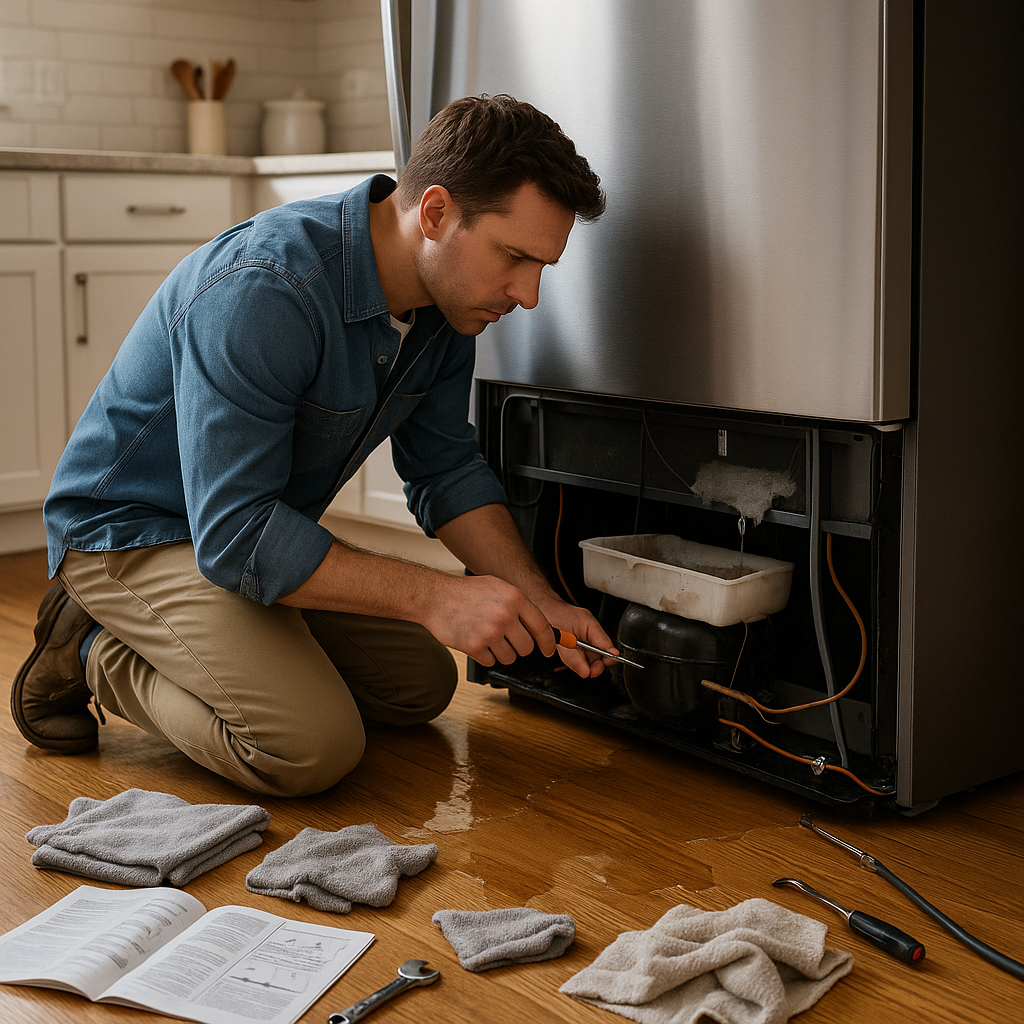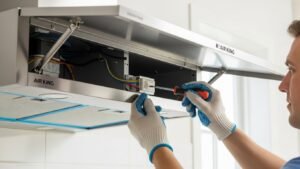A leaking fridge can be a homeowner’s nightmare. Water pooling on the floor or inside the fridge is not just a nuisance. It can lead to bigger problems if not addressed promptly.
Understanding why your refrigerator is leaking water is the first step to fixing it. Common causes range from blocked defrost drains to faulty door seals.
Ignoring these issues can result in mold growth and damage to your flooring.
This guide will help you identify the common causes of fridge water leakage. You’ll also learn how to prevent and fix these issues effectively.
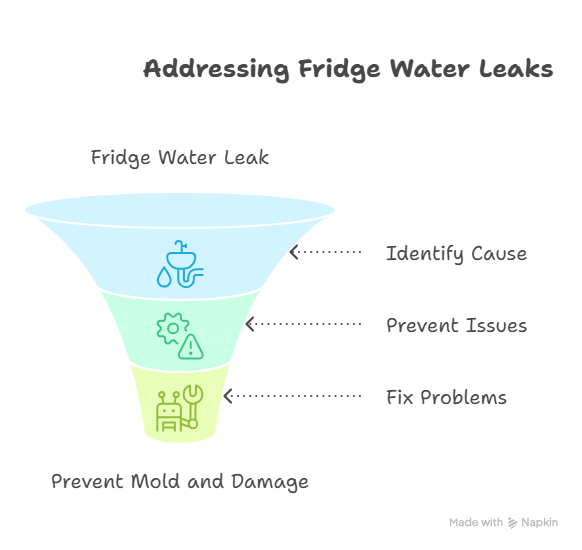
Why Is My Refrigerator Leaking Water? Understanding the Problem
Refrigerators are complex machines with several components that can cause leaks. When water appears inside or around your fridge, it’s important to act quickly.
First, identify the source of the leak. This could be an internal issue or an external factor. Different causes require different solutions.
A leaking fridge can affect its cooling efficiency. Moreover, it can lead to higher energy bills and possibly spoil your stored food.
Common reasons for leaks include:
- Blocked defrost drains
- Frozen or clogged water lines
- Damaged door seals
- Improper leveling
Understanding these causes is essential for effective troubleshooting. Early detection and intervention can save time and prevent costly damages. By recognizing the signs, you can maintain your fridge’s performance and longevity.
Blocked Defrost Drain: The Most Common Culprit
A blocked defrost drain is a frequent cause of refrigerator water leaks. This drain removes condensation by channeling it away, preventing it from pooling inside the fridge. When the drain becomes clogged, it leads to water buildup.
The blockage is often due to debris or ice obstructing the flow. This can create puddles of water at the bottom of your appliance. Regularly checking and cleaning the drain can prevent this from happening.
Signs of a blocked defrost drain include:
- Water pooling inside the fridge
- Visible ice buildup
- Unusual odors from stagnant water
To fix this, manually clear the blockage using a long wire or warm water. Regular maintenance helps keep the drain unobstructed, ensuring your fridge operates efficiently without leaks.
Frozen or Clogged Water Supply Line
A frozen or clogged water supply line can cause a fridge to leak water. This line supplies water to the ice maker and dispenser. When blocked, water can leak onto the floor.
This issue often happens in cold temperatures or if the line is damaged. Check for bends or damage that could impede water flow.
Key indicators of a problem include:
- No water from the dispenser
- Water pooling underneath the fridge
- Reduced ice production
To resolve this, defrost the line using gentle heat, or replace it if damaged. Regular inspection can prevent this issue and ensure your fridge functions properly, avoiding unnecessary water leaks.
Is It Worth It to Repair a Refrigerator? Complete Guide
Damaged or Worn-Out Door Seals
Damaged or worn-out door seals can be a major cause of fridge water leakage. These seals ensure cold air stays in and warm air stays out. When compromised, they cause condensation and water pooling inside.
You might notice your fridge running more often, a sign that seals aren’t working well. Additionally, moisture might accumulate where the door closes.
Look for these signs of faulty door seals:
- Gaps between the door and fridge
- Visible cracks or tears in the rubber
- Moisture around the door edges
To fix this, replace worn-out seals promptly. Regularly cleaning and inspecting the seals will help maintain a proper seal and prevent leakage.
How to Repair Refrigerator Door Seal – Easy DIY Fixes & Expert Tips
Improper Leveling and Installation Issues
Improper leveling of your fridge can lead to water leakage. When a fridge isn’t level, water can pool in unexpected places rather than flowing to the drain pan. This issue also affects the door seals, causing potential gaps for warm air to enter.
Check if your fridge is level by:
- Placing a level tool on top of the fridge
- Adjusting the feet if necessary
- Ensuring the fridge doesn’t tilt forward or backward
Correcting the fridge’s balance helps water flow correctly and ensures efficient functioning. Always follow the manufacturer’s installation guide to avoid these issues initially.
Faulty or Loose Water Filter
A faulty or improperly installed water filter can cause leaks in your fridge. Water might escape around the filter’s seals if not correctly secured. This problem not only causes water leakage but can also affect water quality.
To address this:
- Ensure the filter is properly fitted
- Replace old or damaged filters
- Follow the manufacturer’s instructions for installation
Regularly checking and replacing your fridge’s water filter helps prevent leaks and maintains water purity. Keep track of your filter’s replacement schedule for optimal performance.
Ice Maker and Water Dispenser Problems
Ice maker and water dispenser issues are frequent culprits of fridge leaks. Misaligned ice trays or disconnected water lines can lead to dripping. When ice buildup or blockages occur, water may spill over.
To troubleshoot these problems:
- Check for proper alignment of ice trays
- Inspect water lines for cracks or disconnections
- Clear any ice blockages from dispensers
Regularly examining your ice maker and dispenser helps prevent unnecessary water leaks. These tasks are straightforward and can maintain your refrigerator’s efficient operation. Timely intervention can avoid more extensive repairs later.
Cracked or Overflowing Drain Pan
A cracked or overflowing drain pan is another reason fridges leak water. The drain pan collects excess water, which can lead to leaks if damaged or full.
Common issues with drain pans include:
- Cracks or breaks in the pan
- Overflowing due to excessive condensation
- Improper installation or alignment
Checking the drain pan regularly helps prevent water spillage onto the floor. Fixing any damage promptly can save money on more significant repairs. Keep the pan clean and properly positioned to ensure optimal performance.
Excess Condensation and High Humidity
Excess condensation inside a refrigerator often results from high humidity levels. Humid environments cause moisture buildup, which can drip and pool inside the fridge. Over time, this can lead to leaks and potential food spoilage.
Ways to manage humidity and condensation include:
- Adjusting the fridge’s temperature settings
- Ensuring proper airflow inside the fridge
- Using a dehumidifier in the kitchen
Keeping the refrigerator doors closed as much as possible also helps reduce the humidity inside. Regularly checking seals can ensure efficiency and prevent unnecessary condensation.
Other Causes: User Error, Overfilling, and Environmental Factors
User error and environmental factors often cause water leakage in refrigerators. Simple mistakes like not closing the door properly can lead to leaks. Such errors increase energy use and strain components.
Overfilled fridges lead to poor air circulation, causing condensation and leaks. Free airflow is necessary for efficient cooling.
Environmental factors like power outages or extreme temperatures can also affect a fridge’s performance. Make sure to:
- Avoid overstocking the fridge
- Monitor power supply stability
- Keep the fridge away from direct sunlight
These practices help maintain optimal operation and prevent leaks.
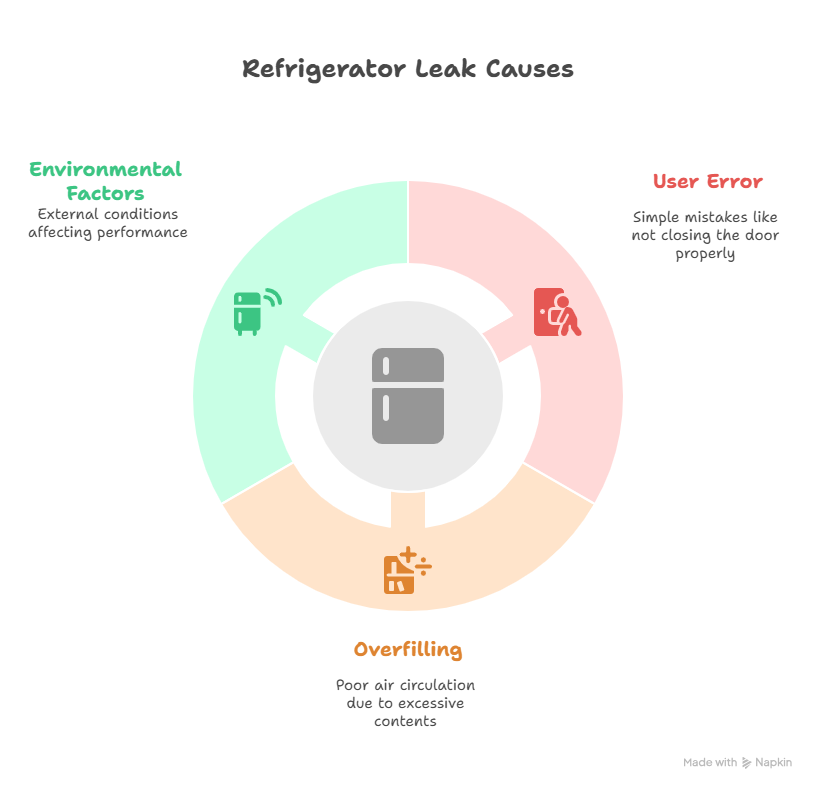
Is a Fridge Leaking Water Dangerous?
A leaking fridge is not immediately dangerous but can lead to bigger issues if ignored. Water can damage floors and cause mold growth, posing health risks.
If left unaddressed, even minor leaks can create unsafe conditions in your kitchen. Consider these potential hazards:
- Electrical risks near outlets
- Slip hazards on wet floors
- Mold and mildew growth
By promptly resolving leakage, you maintain safety and prevent structural damage.
How to Stop a Refrigerator from Leaking Water: Step-by-Step Solutions
To stop your refrigerator from leaking, start by diagnosing the source of the issue. A simple checklist can guide you through fixing common problems.
Begin by checking the defrost drain for clogs and cleaning it with warm water. Next, inspect the water supply line for any blockages or damage.
Here’s a step-by-step guide to tackling fridge leaks:
- Clean the defrost drain using warm water and a soft brush.
- Replace worn door seals to ensure a tight seal.
- Level the fridge using a level tool.
- Check and replace the water filter if loose or faulty.
- Realign the ice maker tray if necessary.
By following these steps, you can effectively stop leaks and prolong your fridge’s life. Regular maintenance helps prevent recurring issues.
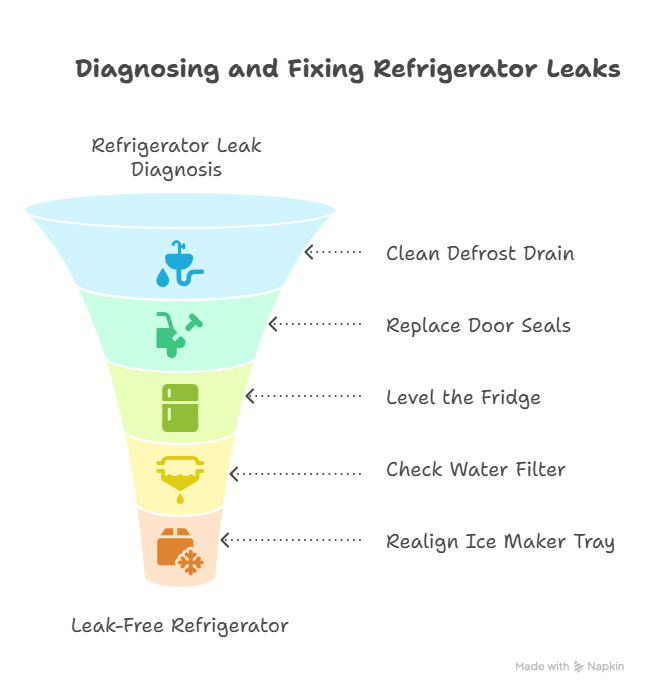
Preventing Future Refrigerator Leaks: Maintenance Tips
Regular upkeep is key to avoiding leaks in your refrigerator. Simple maintenance tasks can save you from costly repairs.
Incorporate these practices into your routine:
- Clean condenser coils every six months to enhance efficiency.
- Check door seals regularly for wear and replace if needed.
- Defrost the freezer periodically to prevent ice buildup.
- Balance the fridge to ensure it stays level.
- Monitor the water supply line for kinks or damage.
By staying proactive with maintenance, you’ll help keep your fridge functioning efficiently and prevent unexpected water leakage. Regular checks can prolong appliance life significantly.
When to Call a Professional for Refrigerator Leaks
Sometimes, refrigerator leaks require more than a DIY approach. Knowing when to call a professional can save your appliance and home from further damage.
Consider professional help if you encounter:
- Persistent leaks despite troubleshooting
- Complicated issues like compressor or drainage failures
- Electrical problems associated with leaks
For complex issues, expertise is crucial. A qualified technician can efficiently diagnose and resolve your fridge’s leakage troubles. Prompt action minimizes the risk of structural damage and mold growth.
Frequently Asked Questions About Fridge Water Leakage
Many people have questions when faced with a leaking fridge. It’s important to address these concerns to ensure your fridge runs smoothly and effectively.
Here are some common questions:
- What should I do first if my fridge leaks?
- Can a leaking fridge damage my floors?
- Are some fridge brands more prone to leaks than others?
Understanding these points helps demystify fridge leaks, making maintenance more manageable. Being informed can prevent minor issues from becoming major headaches.
Conclusion: Keep Your Fridge Dry and Efficient
Addressing and preventing fridge leaks ensures a well-functioning appliance. Regular maintenance not only saves you from unwanted puddles but also keeps your fridge running efficiently.
Be proactive in checking seals, leveling, and cleaning. By staying vigilant, you extend your fridge’s lifespan and preserve its functionality.

